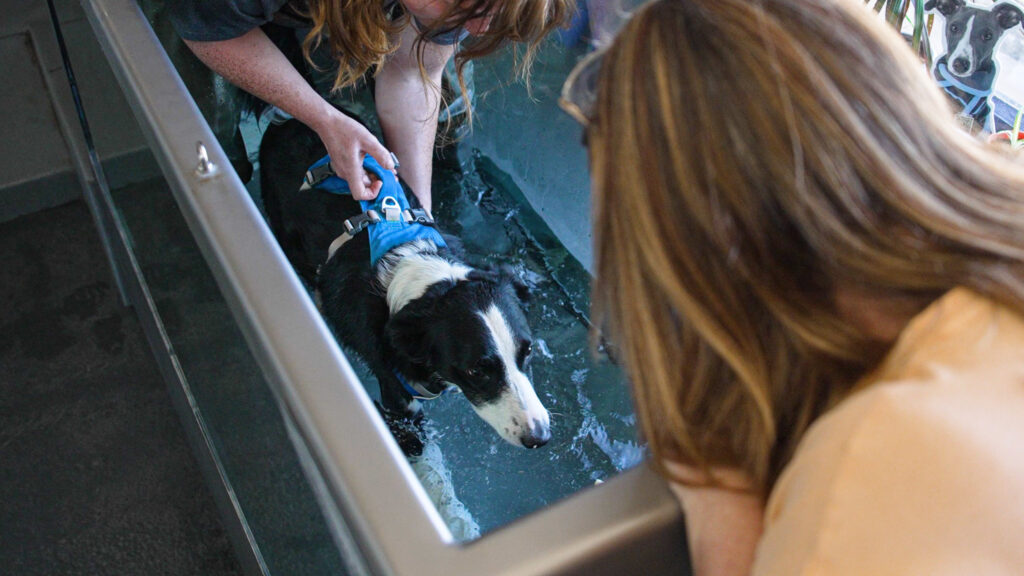Hip Dysplasia in Dogs
Have you noticed your dog slowing down in their back end? Maybe they’re struggling to get up from lying down, hesitating on walks, or just not quite as playful as they used to be. If they seem stiff, sore, or reluctant to do the things they love such as playing, running, or jumping into the car it’s possible that hip dysplasia could be the reason.
The good news? There’s lots we can do to help strengthen and support your dog’s hips.
What is hip dysplasia?
Hip dysplasia is a condition that affects the structure of the hip joint, the hip is a “ball and socket” shape. In dogs with hip dysplasia, the ball (head of the femur) doesn’t sit securely in the socket (acetabulum). This lack of stability means the joint can move in ways it’s not supposed to, which over time causes wear and tear, discomfort, and eventually arthritis.
It’s usually inherited and more common in larger breeds like Labradors, Golden Retrievers, Bulldogs, and Saint Bernards. But lifestyle, environmental, nutrition, overexercise or underexercise can be a trigger for development of hip dysplasia.
Hip dysplasia is not a condition that occurs overtime, it is likely your dog is born with it but learnt to adapt as a young dog to mask the symptoms.
Common signs your dog might be struggling with hip dysplasia
These symptoms often appear gradually, and may be easy to brush off as “just getting older” but spotting them early can really make a difference:
- Stiffness or difficulty rising from lying down
- Hind leg weakness or limping
- A “bunny hopping” run
- Reluctance to go for walks, climb stairs, or jump into the car
- Loss of muscle in the back legs
- Wobbliness or swaying in the hips
If your dog is showing any of these signs, you don’t need to wait until it gets worse. Early support can help prevent the condition progressing further.
Getting a diagnosis
A vet will usually diagnose hip dysplasia with a combination of hands-on assessment and hip X-rays in specific positions. Typically, we see dogs fall into one of two categories:
- Younger dogs learn how to move with hip dysplasia
- Older dogs who begin to show signs of secondary osteoarthritis due to long-term hip instability.
Whether your dog is young or already in their senior years, a personalised rehabilitation plan can make a huge difference to their comfort, movement and quality of life.
How canine physiotherapy can help
At Apollo, we support dogs with hip dysplasia by:
- Thoroughly assessing their movement, strength, flexibility and balance
- Using manual therapy to reduce pain and stiffness
- Designing a tailored exercise programme to build joint stability, improve posture and restore confidence
- Teaching you how to support your dog at home between sessions
We aim to help your dog feel comfortable long-term and give you advice to manage your dog’s condition long-term and delay secondary osteoarthritis from progressing.
What about surgery?
In more advanced cases, surgery like an FHO (Femoral Head Ostectomy) or full hip replacement may be recommended. But even in these cases, rehab is vital both before and after surgery to give your dog the best possible recovery.
Many dogs, however, can avoid surgery altogether through multi-modal support:
- Physiotherapy
- Hydrotherapy
- Weight management
- Tailored, healthy diet
- Exercise management
- Home environmental modifications
- Joint supplements and pain relief medication if required
- Regular monitoring
How can physiotherapy and hydrotherapy help?
Physiotherapy and hydrotherapy are core components managing hip dysplasia in dogs. Physiotherapy plays a vital role in reducing pain, improving mobility, preserving muscle mass and enhancing quality of life. Our main aims for physiotherapy and hydrotherapy are:
- Improve joint range of motion
- Strengthening muscles around the hips to enhance joint stability
- Improve gait and limb function
- Prevent muscle atrophy
- Improved proprioception and balance
- Improve cardiovascular fitness
- Improve function
- Prevent secondary compensations
What our previous paw parents have said!
“Apollo is absolutely amazing with our two German Shepherds, Mac and Moon. They both have multiple health issues, including hip dysplasia, lumbosacral disease, and spondylosis, as well as anxiety. From the moment they met Heidi, she put them (and us) at ease and has since gone on to help them incredibly. They both enjoy the hydrotherapy, and the improvement we’ve seen in them is beyond anything we could ever have imagined. Apollo Animal Physiotherapy & Hydrotherapy has been life-changing for Mac and Moon. Highly recommended.”
“We have been attending physiotherapy and hydrotherapy sessions with Heidi over the past 6 weeks for Teddy. Teddy has muscular atrophy caused by hip dysplasia. After just a few sessions and given the right tools/exercises, Teddy has made a drastic improvement, he has built muscle up around the back end, his limp after long walks has completely gone, he is back to his old, puppy self, walking and playing pain free now. Heidi is absolutely amazing, she has extensive knowledge and is great with both Teddy and myself. Teddy absolutely loves seeing Heidi and always smiles and gives kisses. Would recommend Apollo to anyone, especially if you want to avoid medicating or ailments getting worse for as long as possible. Fantastic service and the team are all lovely! Thank you for fixing my Puppy!”
“Apollo are brilliant. We adopted our Golden retriever around 6 months ago unknowing of her bad hips. Our specialist advised us to start Hydro therapy and physio and the improvement is huge already. Margo now has almost full range of movement which will mean either no surgery is necessary or most definitely delayed. Her behaviour has also improved as she’s in less pain! You guys are the best. We cannot thank you enough for helping our pup.”
“Laura has been treating Ossie for a few weeks now and the difference in him is simply amazing. After a double hip replacement there was a lot of work that needed doing to build him up. He has been having hydrotherapy, laser treatment and physio. Laura is incredibly knowledgeable, gentle and so, so caring; she also sends out a comprehensive summary of the session with clear instructions for exercises to continue at home. Ossie always trots into the practice quite happily and is nearly ready to be signed off. Such an amazing recovery. “
Whatever route you choose, we’re here to help guide you through how to manage your dog with hip dysplasia.
Contact Us
- 07300 020 514
- bookings@apolloanimalphysio.com
- apolloanimalphysio@gmail.com
- Apollo Animal Physiotherapy, Old Haine Road, Ramsgate, CT12 5AG


